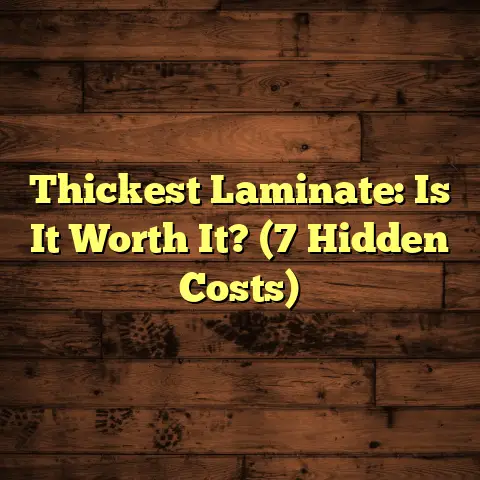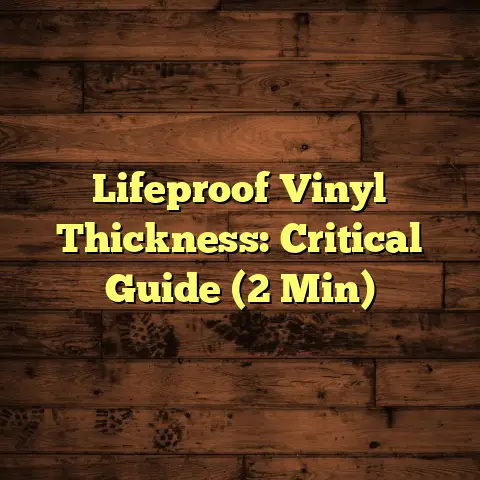Top Hardwood Glue For Concrete Floors? (6 Options)
I’m excited to talk about a topic near and dear to my heart: hardwood floors!
Specifically, we’re diving into the world of adhesives for installing those beautiful planks over concrete.
Hardwood floors offer a timeless elegance and a touch of warmth that’s hard to beat.
Plus, let’s be honest, they’re a breeze to keep clean compared to carpets!
A simple sweep or a quick run with a microfiber mop and you’re good to go.
But the key to a long-lasting and gorgeous hardwood floor on concrete?
It all starts with the right glue.
Think of it as the unsung hero, working tirelessly beneath the surface to keep everything in place.
Choosing the wrong adhesive can lead to nightmares like cupping, buckling, and that dreaded hollow sound when you walk across the floor.
Trust me, I’ve seen it all!
That’s why I’ve put together this guide to the top six hardwood glues specifically designed for concrete floors.
We’ll break down their features, benefits, and potential drawbacks, so you can make an informed decision for your project.
So, grab a cup of coffee, settle in, and let’s get started!
Section 1: Factors to Consider When
Choosing Hardwood Glue
Okay, before we jump into the specific products, let’s talk about what makes a good hardwood glue for concrete.
There are several factors that come into play, and understanding them will help you narrow down your choices.
Type of Adhesive:
This is the big one.
You’ll typically encounter three main types: polyurethane, water-based, and solvent-based.
-
Polyurethane adhesives are known
for their exceptional strength and
moisture resistance.They form a very strong bond, which
is great for stability.I’ve used them in challenging
environments and been consistently
impressed.
* Water-based adhesives are
generally more eco-friendly and have
lower VOC (volatile organic
compounds) emissions.They’re easier to clean up, too!
However, they might not offer the
same level of moisture resistance as
polyurethane options.
* Solvent-based adhesives used to
be the go-to, but they’re becoming
less common due to environmental
concerns and stricter regulations.They offer a strong bond, but the
fumes can be a real issue.
Curing Time:
How long the glue takes to fully cure is crucial.
A faster curing time means you can get back on your floor sooner.
But it can also mean less time to make adjustments during installation.
Always follow the manufacturer’s recommendations for curing time.
Rushing it can compromise the bond.
Moisture Resistance:
Concrete can hold moisture, even if it doesn’t feel damp to the touch.
This is a big deal!
Moisture can wreak havoc on hardwood floors, causing warping, cupping, and other issues.
That’s why a moisture-resistant adhesive is a must-have.
Look for adhesives specifically formulated to prevent moisture migration.
I always recommend testing the concrete for moisture levels before installation.
A simple calcium chloride test can give you valuable insights.
Flexibility and Bonding Strength:
Hardwood expands and contracts with changes in temperature and humidity.
The adhesive needs to be flexible enough to accommodate this movement without cracking or losing its bond.
At the same time, it needs to be strong enough to hold the wood firmly in place.
It’s a delicate balance!
Ease of Application:
Some adhesives are easier to work with than others.
Consider the viscosity (thickness) of the glue, the type of applicator required, and the cleanup process.
If you’re a DIYer, you might prefer an adhesive that’s forgiving and doesn’t require specialized tools.
Environmental Impact:
More and more people are looking for eco-friendly options, and for good reason.
Low-VOC adhesives are better for your health and the environment.
Look for certifications like GreenGuard or FloorScore.
These certifications indicate that the adhesive has been tested and meets stringent emissions standards.
Section 2: Top 6 Hardwood Glues for
Concrete Floors
Alright, let’s get to the good stuff!
Based on my experience and countless hours of research, here are my top six hardwood glues for concrete floors:
Bostik’s Best
-
Product Description: Bostik’s
Best is a single-component,
urethane-based adhesive that’s
known for its exceptional bond
strength and moisture resistance. -
Key Benefits:
- It forms a tenacious bond to
concrete, even with residual
moisture. - It has sound dampening
properties, which can reduce
noise transmission. -
It’s easy to trowel and has a
long open time, giving you
plenty of time to position the
wood.This is a big plus for larger
projects!
* Application Instructions:
* Ensure the concrete is clean,
dry, and level.
* Apply the adhesive with the
recommended trowel (usually a
V-notch or U-notch).
* Lay the hardwood planks
immediately, pressing firmly
into the adhesive.
* Allow the adhesive to cure
completely before walking on
the floor.
* Pros and Cons:
* Pros: Excellent bond,
moisture resistant, sound
dampening.
* Cons: Can be a bit pricey,
requires careful surface
preparation.
* User Reviews: Users rave about
Bostik’s Best’s holding power and
ability to handle moisture.
Some note that it can be a bit
messy to work with, so be sure to
have plenty of cleanup supplies
on hand.
* Price Range: \$60-\$80 per
gallon.
2.
Mapei Ultrabond ECO 980 - It forms a tenacious bond to
-
Product Description: Mapei
Ultrabond ECO 980 is a
high-performance,
100%-solids, one-component,
urethane adhesive specifically
designed for wood flooring. -
Key Benefits:
- It’s formulated with bio-based
materials. - It provides a strong,
permanent bond. -
It has a low odor and is
VOC-compliant.This makes it a great choice
for sensitive individuals.
* Application Instructions:
* Prepare the concrete surface
according to Mapei’s
recommendations.
* Apply the adhesive with the
specified trowel.
* Install the hardwood flooring
within the adhesive’s open
time.
* Roll the floor with a heavy
roller to ensure proper
contact.
* Pros and Cons:
* Pros: Strong bond,
eco-friendly, low odor.
* Cons: Can be a bit stiff to
trowel, requires a heavy roller
for optimal adhesion.
* User Reviews: Users appreciate
the Ultrabond ECO 980’s
eco-friendly formula and strong
bond.
Some have found it a bit challenging
to trowel smoothly, so practice
makes perfect!
* Price Range: \$55-\$75 per
gallon.
3.
SikaBond-T21 - It’s formulated with bio-based
-
Product Description: SikaBond-T21
is a one-component,
moisture-curing, elastic adhesive
specifically formulated for wood
flooring installations. -
Key Benefits:
- It offers excellent adhesion to
a variety of substrates,
including concrete. - It provides sound reduction
properties. -
It’s easy to apply with a
trowel.I find it to be very user-friendly.
* Application Instructions:
* Ensure the concrete is clean,
dry, and structurally sound.
* Apply the adhesive with the
appropriate notched trowel.
* Install the wood flooring,
ensuring full contact with the
adhesive.
* Allow the adhesive to cure
fully before heavy traffic.
* Pros and Cons:
* Pros: Excellent adhesion,
sound reduction, easy to apply.
* Cons: Can be sensitive to
temperature and humidity during
installation.
* User Reviews: Users praise
SikaBond-T21 for its ease of
application and strong bond.
Some have noted that it can be
affected by extreme temperature
swings during the curing process,
so be mindful of the environment.
* Price Range: \$70-\$90 per
gallon.
4.
Franklin Titebond 821 Premium
Urethane Wood Flooring Adhesive - It offers excellent adhesion to
-
Product Description: Titebond
821 is a premium-grade,
urethane-based adhesive designed
for wood flooring installations
over concrete and other
substrates. -
Key Benefits:
- It provides a strong,
permanent bond. - It’s moisture-resistant.
-
It has a long open time.
This is great for larger projects
or if you’re working solo.
* Application Instructions:
* Prepare the concrete surface
according to Titebond’s
instructions.
* Apply the adhesive with the
recommended trowel.
* Install the wood flooring,
ensuring proper contact.
* Allow the adhesive to cure
completely.
* Pros and Cons:
* Pros: Strong bond, moisture
resistant, long open time.
* Cons: Can be a bit messy to
work with, requires careful
surface preparation.
* User Reviews: Users appreciate
Titebond 821’s strong bond and
long open time.
Some have found it to be a bit
challenging to clean up, so have
mineral spirits on hand.
* Price Range: \$50-\$70 per
gallon.
5.
Wakol MS 262 Wood Flooring Adhesive - It provides a strong,
-
Product Description: Wakol MS
262 is a solvent-free,
isocyanate-free, and water-free
adhesive based on MS Polymer
technology. -
Key Benefits:
- It’s environmentally friendly.
- It offers excellent adhesion to
concrete. -
It has a wide range of
applications.This is a versatile adhesive.
* Application Instructions:
* Prepare the concrete surface
according to Wakol’s
guidelines.
* Apply the adhesive with the
specified trowel.
* Install the wood flooring,
ensuring full contact.
* Allow the adhesive to cure
before heavy use.
* Pros and Cons:
* Pros: Eco-friendly,
excellent adhesion, versatile.
* Cons: Can be more expensive
than other options, may require
specialized trowel.
* User Reviews: Users praise
Wakol MS 262 for its
eco-friendliness and strong bond.
Some have noted that it can be a
bit pricier than other adhesives,
but the environmental benefits
are worth it.
* Price Range: \$80-\$100 per
gallon.
6.
DriTac 7800 Wood Tac -
Product Description: DriTac 7800
Wood Tac is a premium,
water-based acrylic urethane
adhesive designed for wood
flooring installations. -
Key Benefits:
- It’s environmentally friendly
with low VOCs. - It provides a strong bond.
-
It’s easy to clean up with
water.This makes it a great choice for
DIYers.
* Application Instructions:
* Prepare the concrete surface
according to DriTac’s
recommendations.
* Apply the adhesive with the
specified trowel.
* Install the wood flooring,
ensuring proper contact.
* Allow the adhesive to cure
completely before use.
* Pros and Cons:
* Pros: Eco-friendly, strong
bond, easy cleanup.
* Cons: May not be as moisture
resistant as polyurethane
options, requires careful
surface preparation.
* User Reviews: Users appreciate
DriTac 7800’s ease of use and
eco-friendly formula.
Some have noted that it may not
be the best choice for areas with
high moisture levels.
* Price Range: \$45-\$65 per
gallon. - It’s environmentally friendly
-
Section 3: Conclusion
So, there you have it!
My top six hardwood glues for concrete floors.
Choosing the right adhesive is crucial for the success of your flooring project.
It’s the foundation upon which your beautiful hardwood floor will stand.
Remember to consider your specific needs and circumstances when making your decision.
Think about the moisture levels in your environment, the type of hardwood you’re using, and your budget.
Don’t be afraid to do your research and read reviews from other users.
And most importantly, don’t cut corners on quality.
A little extra investment in a good adhesive can save you a lot of headaches down the road.
Whether you prioritize strength, eco-friendliness, or ease of application, there’s a perfect glue out there for you.
I hope this guide has been helpful in your search for the perfect adhesive.
Happy flooring!





